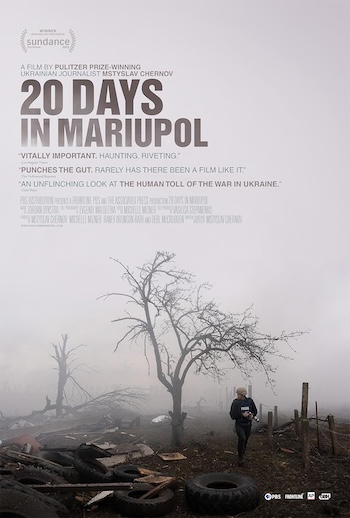‘Frontline’ film ‘20 Days in Mariupol’ wins Oscar for best documentary

Patrick T. Fallon / AFP
Ukrainian filmmaker Mstyslav Chernov (center), flanked by (from left) "Frontline" EP Raney Aronson-Rath, Associated Press producer Vasilisa Stepanenko, AP photographer Evgeniy Maloletka and "Frontline" producer and editor Michelle Mizner, accepts the award for Best Documentary Feature Film for "20 Days in Mariupol" onstage during the 96th Annual Academy Awards Sunday at the Dolby Theatre in Hollywood, Calif.
20 Days in Mariupol, a feature-length documentary jointly produced by the Associated Press and the investigative series Frontline, won an Academy Award Sunday for best documentary feature film.
The 2023 documentary, directed by Mstyslav Chernov, focuses on the nearly three weeks he and colleagues spent in the besieged city of Mariupol in February and March 2022, at the start of Russia’s invasion of Ukraine. Upon accepting the award, Chernov spoke out against the invasion.
“Probably I’ll be the first director on this stage who will say, ‘I wish I never made this film,’” Chernov said. “I wish to be able to exchange this to Russia never attacking Ukraine, never occupying our cities. I wish to give it all the recognition to Russia not killing tens of thousands of my fellow Ukrainians. I wish for them to release all the hostages, all the soldiers who are protecting their lands, all the civilians who are now in their jails,” he added.
“But I cannot change the history. I cannot change the past,” Chernov continued. “But we altogether, among you, some of the most talented people in the world, we can make sure the history record is set straight, and that the truth will prevail, and that the people of Mariupol, and those who have given their lives, will never be forgotten. Because cinema forms memories, and memories form history.”

He ended his speech with “Slava Ukraini,” which means “Glory to Ukraine.”
20 Days in Mariupol, which is also the first Ukrainian film to win an Oscar, covers AP journalists Chernov, photographer Evgeniy Maloletka and producer Vasilisa Stepanenko arriving around an hour before Russia started bombing the port city. Two weeks later, they were the last journalists working for an international outlet in Mariupol. In a 2023 interview with the AP, Chernov said that his team had gathered 30 hours of footage to use for the film.
20 Days in Mariupol debuted at the Sundance Film Festival last year, where it won the world cinema audience award for documentaries. It had already won the 2023 Pulitzer Prize for public service. It was considered a favorite for the Academy Award after winning best documentary from the Directors Guild of America and BAFTA.
The third nomination was the charm for Frontline, overseen by GBH in Boston. It was the series’ third nomination and its first Oscar win. The nomination and victory were firsts both for Chernov, a video journalist for the AP, and the organization itself. The director accepted the award and was joined on stage by Frontline EP Raney Aronson-Rath and Frontline producer and editor Michelle Mizner.
In an email newsletter Monday, GBH CEO Susan Goldberg said, “It isn’t easy to ‘celebrate’ a film that so viscerally and personally depicts the horror of Russia’s invasion of Ukraine,” noting the images of parents weeping over their dead children.
“If you haven’t been in a war zone yourself, I doubt you have ever seen anything like it,” Goldberg wrote. “This film takes you there, bearing witness to the brutal truth taking place. But this Oscar is indeed worth celebrating, because 20 Days in Mariupol … is all about the power of storytelling to change the world. And now, as the war drags on into its third year, more people than ever will see this film — and each of them will more clearly understand what is at stake.”
In an interview Monday, Aronson-Rath told Current that the recognition from the academy is “bittersweet” due to the ongoing war in Ukraine. But she also said that the Oscar win represents an important moment for public media and mission-driven public affairs programming, particularly journalism that features “on-the-ground reporting” telling viewers “what’s actually happening in the world.” It also reinforces the idea that “cinematic storytelling,” paired with hard-hitting journalism, is valuable to audiences, she said.

In addition to praising her co-producing partners at the AP, she noted that all of public media’s key leaders and organizations supported the film’s promotional campaign and national distribution, naming Goldberg, CPB President Pat Harrison, PBS President Paula Kerger and PBS Distribution President Andrea Downing.
“When I told them that I wanted to have a big campaign to actually get the word out about the film and to actually go into festivals and into the theater, they supported that effort together,” she said. “This public media moment of everyone saying that this mattered enough to help me, and to help Frontline, and help this film, was really emotional last night.”
Competing with 20 Days in Mariupol for the award were Bobi Wine: The People’s President, which focused on the presidential campaign of popular Ugandan singer Bobi Wine; The Eternal Memory, which follows the relationship of Chilean journalist Augusto Góngora and Chilean actress Paulina Urrutia; Four Daughters, a film about the disappearance of a mother’s two daughters; and To Kill a Tiger, set in India, where a family campaigns for justice after their teenage daughter is raped.
The previous Frontline productions that received Oscar nominations were the 2019 film For Sama and the 2016 film Abacus: Small Enough to Jail. 20 Days in Mariupol is available to stream for free on Frontline’s website and YouTube.





